鲁教版小学五年级英语课堂笔记
鲁教版小学英语五年级下册英语知识点归纳
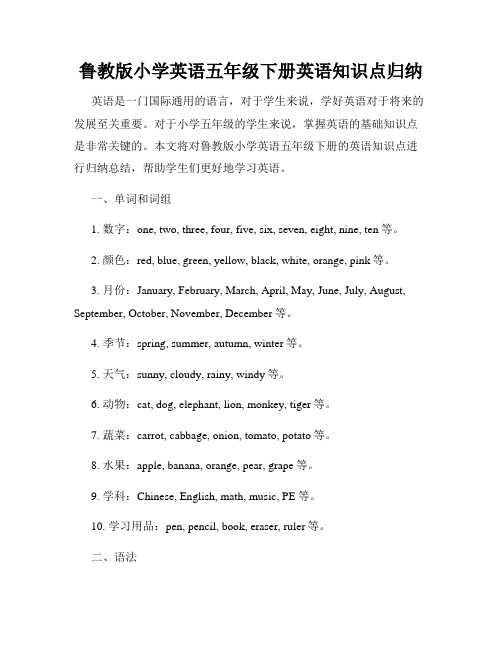
鲁教版小学英语五年级下册英语知识点归纳英语是一门国际通用的语言,对于学生来说,学好英语对于将来的发展至关重要。
对于小学五年级的学生来说,掌握英语的基础知识点是非常关键的。
本文将对鲁教版小学英语五年级下册的英语知识点进行归纳总结,帮助学生们更好地学习英语。
一、单词和词组1. 数字:one, two, three, four, five, six, seven, eight, nine, ten等。
2. 颜色:red, blue, green, yellow, black, white, orange, pink等。
3. 月份:January, February, March, April, May, June, July, August, September, October, November, December等。
4. 季节:spring, summer, autumn, winter等。
5. 天气:sunny, cloudy, rainy, windy等。
6. 动物:cat, dog, elephant, lion, monkey, tiger等。
7. 蔬菜:carrot, cabbage, onion, tomato, potato等。
8. 水果:apple, banana, orange, pear, grape等。
9. 学科:Chinese, English, math, music, PE等。
10. 学习用品:pen, pencil, book, eraser, ruler等。
二、语法1. 一般现在时:用于表述现在经常性、习惯性的动作或状态。
例如:I like playing soccer.2. 一般过去时:用于过去发生的动作或状态。
例如:I watched a movie yesterday.3. to be动词的变化:am, is, are, was, were等。
例如:She is happy.4. be动词与形容词的搭配:例如:I am hungry.5. 祈使句:用于表达请求、建议或命令。
鲁科版(三起)五年级英语上册知识点总结
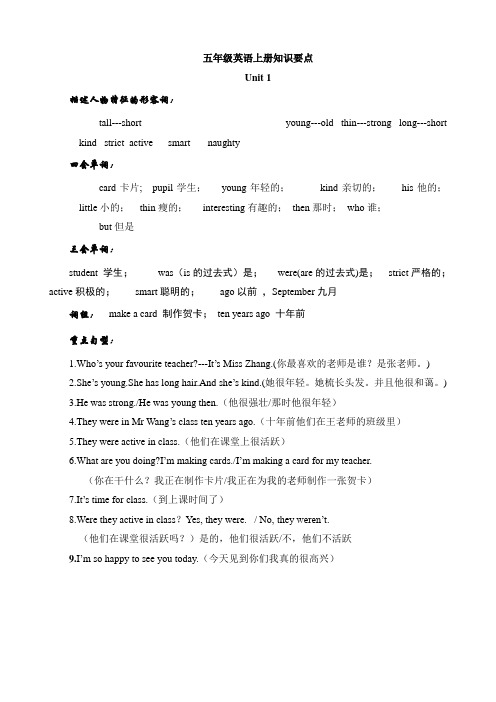
五年级英语上册知识要点Unit 1描述人物特征的形容词:tall---short young---old thin---strong long---short kind strict active smart naughty四会单词:card卡片; pupil学生;young年轻的;kind亲切的;his他的;little小的;thin瘦的;interesting有趣的;then那时;who谁;but但是三会单词:student 学生;was(is的过去式)是;were(are的过去式)是;strict严格的;active积极的;smart聪明的;ago以前,September九月词组:make a card 制作贺卡;ten years ago 十年前重点句型:1.Who’s your favourite teacher?---It’s Miss Zhang.(你最喜欢的老师是谁?是张老师。
)2.She’s young.She has long hair.And she’s kind.(她很年轻。
她梳长头发。
并且他很和蔼。
)3.He was strong./He was young then.(他很强壮/那时他很年轻)4.They were in Mr Wang’s class ten years ago.(十年前他们在王老师的班级里)5.They were active in class.(他们在课堂上很活跃)6.What are you doing?I’m making cards./I’m making a card for my teacher.(你在干什么?我正在制作卡片/我正在为我的老师制作一张贺卡)7.It’s time for class.(到上课时间了)8.Were they active in class?Yes, they were. / No, they weren’t.(他们在课堂很活跃吗?)是的,他们很活跃/不,他们不活跃9.I’m so happy to see you today.(今天见到你们我真的很高兴)Unit 2四会单词:look看起来;find找到;worry担心;angry生气的;sad难过的;late迟到;why为什么;yesterday昨天;with 和…在一起三会单词:sky天空;lost(lose的过去式,过去分词)丢失;saw(see的过去式)看见;wasn’t. (was not)不是excited激动的;glad高兴的;worried担心的;poor可怜的;helpful有帮助的词组:come back 回来;come in 进来;重点句型:1.He’s excited.(他很兴奋)2He was sad.(他很伤心)3Was he happy?---Yes,he was./No, he wasn’t.(他很高兴吗?是的,他高兴/不是,他不高兴)4---Wang Hong is worried.Why?---She can’t find her English book.王红很担心,为什么?她找不到她的英语书了。
鲁科版五年级英语校内下册重点汇总
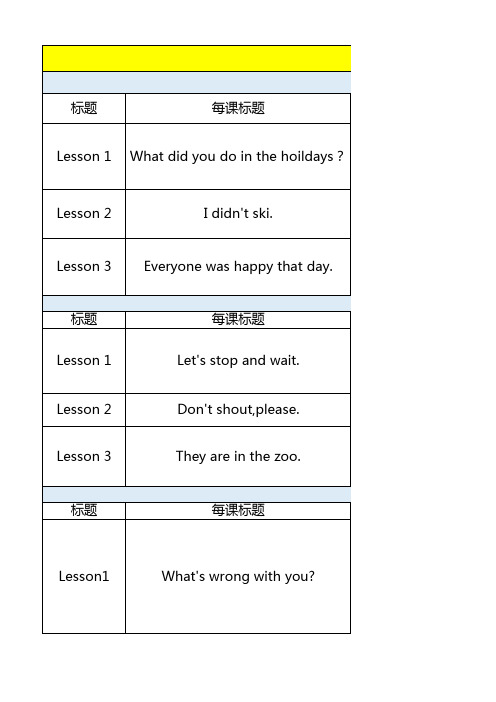
重点问答句 I.This is Andy. 2.-Where is Henry from? -He's from the U.S. 1.-What are the men doing in the garden? -They're playing Chinese chess. 2. And there is a supermarket beside it.
标题
每课标题
Lesson 1 There is a river near the village.
Lesson 2 Lesson 3
How many ducks do you have? He goes to school by school bus.
标题 Lesson 1
每课标题
What are you going to do this summer holiday?
at the weekend
重点词组
the London Eye the British Museum
get ready
They are having lots of fun.
Unit 5-Country Life
重点问答句 1.There are many birds in the trees.
2.Are there any fish in it? Yes,there are lots of fish.
How many ducks do you have? Twenty-one.
Don't+动词原形+(其他)
湘鲁版五年级上册英语知识点汇总

湘鲁版五年级上册英语知识点汇总五(上)Unit 1 There is a big music room.一、单词:playground 操场class 班级nice garden 漂亮的花map 地图big 大small 小school map 学校地图music room 音乐室nice 漂亮的,好的everyone 每个人many 许多behind 在…后面二、重点句子There is a big music room! 有一间大的音乐室。
There is a small garden. 有一个小花园。
There are many trees and flowers. 有许多树和花。
--Is the playgroud big? 这个操场大吗?--Yes, it is. 是的。
/No, it isn’t. 不是。
三、对话A:Hi!My name is Zhou Lin. Welcome to our school! I’m in class 5. B: Hi. I’m Li Wei!Nice to meet you. I like my new school. There is a big music room!A: I like it, too. There is a nice playground and a small garden.五(上)Unit 2 Where is the library?一、单词building 建筑物toilet 厕所second floor 二楼go straight 直走left 左right 右turn left 向左转turn right 向右转will 将then 然后far away 遥远close by 在旁边way 路This way. 这边走。
visitor 参观者restaurant 餐馆bank 银行hotel 酒店office 办公室so 因此walk 走路often 经常二、重点句子Where is the park? 公园在哪里?Go straight and then turn left. 直走然后左转。
鲁科版五年级英语上册知识总结

(最新鲁科版)五年级英语上册复习总结Unit 1 Teachers’ Day功能:谈论人物外貌及性格特征一、描述人物特征的形容词:tall---short;young---old; thin---strong; long---short; kind strict active smart naughty 二、四会单词(11个)card卡片; who谁;young年轻的;kind亲切的;then那时;his他的;little小的;thin瘦的;interesting有趣的;pupil学生;but但是三、三会单词(8个)September 九月;strict严格;was(is的过去式)是;were (are的过去式) 是;ago以前active积极的;naughty 淘气的;smart聪明的;四、词组:make a card 制作贺卡;ten years ago 十年前五、重点句型:1. --Who’s your favorite teacher? 你最喜欢的老师是谁?--Mr/Ms/Miss...2. --What’s your teacher like? 你的老师什么样子?--She’s very kind.她非常和蔼。
3. She has long hair. 她有长发。
【句型:She’s /He’s+形容词She /He has +形容词+ 名词(hair/nose/eyes)等】4. I /She /He was young then. We/You/They were young then.5. Her /His hair was black. 他的/她的头发是黑色的。
六、语音:字母x的发音/ ks / six box fox excuse;字母y的发音/ ai / my by fly sky;字母z的发音/ z / zoo zip zero zebra七、语法:含有be动词的一般过去时态*含义:表示过去某个时间存在的状态,be动词的形式为过去式:was或were;*结构:主语(可以是人,也可以是物)+be动词(was/were)+名词或形容词…+过去的时间;*表示过去的时间状语(一般放在句尾):yesterday(昨天);then(当时,那时);last week/year…(上周/去年......);时间段+ago (例如:two days/ten years ago两天前/十年前);*例:陈述句:1. I was 9 last year. 我去年九岁。
英语五年级上册课堂笔记
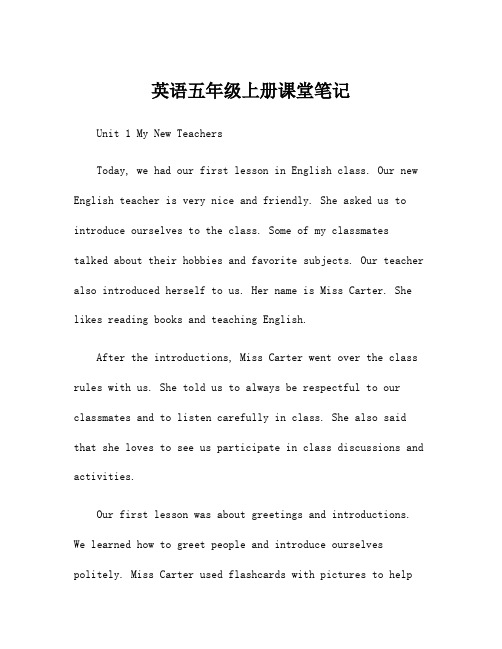
英语五年级上册课堂笔记Unit 1 My New TeachersToday, we had our first lesson in English class. Our new English teacher is very nice and friendly. She asked us to introduce ourselves to the class. Some of my classmates talked about their hobbies and favorite subjects. Our teacher also introduced herself to us. Her name is Miss Carter. She likes reading books and teaching English.After the introductions, Miss Carter went over the class rules with us. She told us to always be respectful to our classmates and to listen carefully in class. She also said that she loves to see us participate in class discussions and activities.Our first lesson was about greetings and introductions. We learned how to greet people and introduce ourselves politely. Miss Carter used flashcards with pictures to helpus learn new words like "hello," "good morning," and "my name is."I really enjoyed our first English class. It was fun and Miss Carter made the lesson interesting. I'm looking forward to learning more in the coming lessons.Unit 2 My School DayToday's lesson was about my school day. We learned about the different subjects we study in school. Miss Carter taught us how to talk about our school schedule using words like "first," "next," and "then." We also learned to tell the time in English.We practiced asking and answering questions about our school day. I learned phrases like "What time is math class?" and "What do you have after lunch?" Miss Carter encouraged us to speak in full sentences and to use the vocabulary we learned in class.I found the lesson very useful because now I can talk about my school day in English. This will be helpful when I meet new English-speaking friends and teachers.I really like learning English with Miss Carter. She makes the lessons fun and interesting. I can't wait for our next lesson!。
五年级上册英语书课堂笔记

五年级上册英语书课堂笔记Unit 1: My School LifeIn this unit, we learned about various topics related to school life. We discussed school subjects, daily routines, and extracurricular activities. We also practiced asking and answering questions about our school and classmates.School Subjects:- English: We learned new vocabulary words and practiced speaking and listening skills through dialogues and role plays. We also focused on reading comprehension and writing short paragraphs.- Mathematics: We studied different mathematical concepts such as addition, subtraction, multiplication, and division. We solved problems and practiced mental math skills.- Science: We explored various scientific topics such as plants, animals, and the environment. We conducted experiments and learned about the scientific method.- Social Studies: We learned about different countries, their cultures, and geographical features. We discussed historical events and the importance of global citizenship.- Physical Education: We participated in different sports activities and learned about the importance of physical fitness for a healthy lifestyle.Daily Routines:- We practiced talking about our daily routines using the Present Simple tense. We learned vocabulary related to daily activities such as waking up, brushing teeth, eating breakfast, going to school, attending classes, doing homework, and sleeping.- We also learned how to use adverbs of frequency such as always, often, sometimes, usually, and never to describe how often we do certain activities.Extracurricular Activities:- We discussed various extracurricular activities that students can participate in, such as sports, music lessons, art clubs, and drama clubs. We talked about our personal interests and shared our experiences.- We learned how to express likes, dislikes, and preferences using phrases such as "I enjoy playing basketball" or "I don't like playing the piano."Asking and Answering Questions:- We practiced asking and answering questions using question words such as who, what, when, where, why, and how. We learned about sentence structure and proper intonation to make questions.- We also learned how to provide detailed answers using complete sentences, including subject-verb agreement and appropriate verb tenses.Unit 2: My FamilyIn this unit, we focused on talking about our family members and describing their appearance and personality. We also learned about family traditions and celebrations.Family Members:- We learned vocabulary words related to family members such as father, mother, sister, brother, grandparents, and cousins. We practiced introducing our family members to others.- We also learned how to use possessive adjectives such as my, your, his, her, our, and their to describe relationships.Appearance and Personality:- We described the physical appearance of our family members using adjectives such as tall, short, slim, and overweight. We also learned words to describe personality traits such as kind, funny, serious, and helpful.- We practiced using comparatives and superlatives to make comparisons between family members, such as "My sister is taller than my brother" or "My mother is the kindest person I know."Family Traditions and Celebrations:- We learned about different family traditions and celebrations such as birthdays, holidays, and special occasions. We discussed how different cultures celebrate these events.- We practiced talking about our own family traditions and shared stories about memorable celebrations we have had.Overall, this unit provided us with a deeper understanding of school life, family values, and the importance of interpersonal relationships. We enhanced our English language skills through vocabulary acquisition, conversation practice, and grammatical structures.。
3. 鲁科版五上知识点解析定版
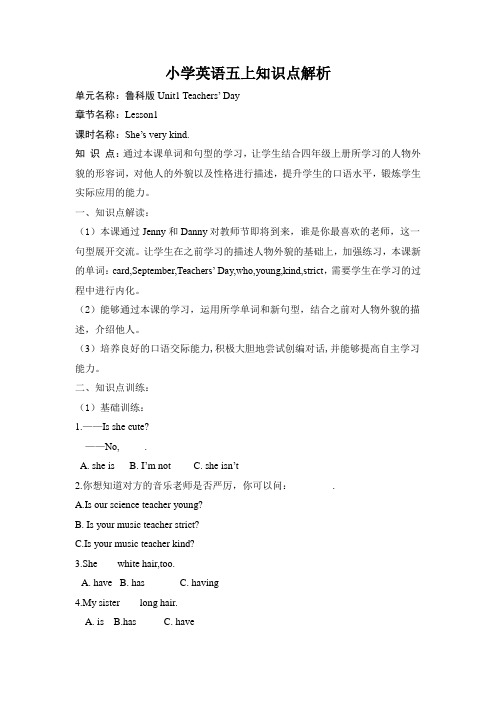
小学英语五上知识点解析单元名称:鲁科版Unit1 Teachers’ Day章节名称:Lesson1课时名称:She’s very kind.知识点:通过本课单词和句型的学习,让学生结合四年级上册所学习的人物外貌的形容词,对他人的外貌以及性格进行描述,提升学生的口语水平,锻炼学生实际应用的能力。
一、知识点解读:(1)本课通过Jenny和Danny对教师节即将到来,谁是你最喜欢的老师,这一句型展开交流。
让学生在之前学习的描述人物外貌的基础上,加强练习,本课新的单词:card,September,Teachers’ Day,who,young,kind,strict,需要学生在学习的过程中进行内化。
(2)能够通过本课的学习,运用所学单词和新句型,结合之前对人物外貌的描述,介绍他人。
(3)培养良好的口语交际能力,积极大胆地尝试创编对话,并能够提高自主学习能力。
二、知识点训练:(1)基础训练:1.——Is she cute?——No,_____.A. she isB. I’m notC. she isn’t2.你想知道对方的音乐老师是否严厉,你可以问:________.A.Is our science teacher young?B. Is your music teacher strict?C.Is your music teacher kind?3.She____white hair,too.A. haveB. hasC. having4.My sister____long hair.A. isB.hasC. have5.别人想知道你的爸爸个子是否高,会问: .A.Is your dad tall?B. Is your dad short?C. Is your dad has long hair?6.Danny has____short hair.A.aB. anC. /7.Tomorrow is September 10.It’s________.A.Teachers’ DayB.Children’s DayC.Mother’s Day(2)能力训练:1.Jenny has _______ hair.2.She is short. She has long hair.A.√B.ו3._____the third day of September.A.9月3日B.9月5日(3)拓展训练:1.阅读短文。
鲁科版(三起)五年级英语上册知识点总结

五年级英语上册知识要点Unit 1描述人物特征的形容词:tall---short young---old thin---strong long---short kind strict active smart naughty四会单词:card卡片; pupil学生;young年轻的;kind亲切的;his他的;little小的;thin瘦的;interesting有趣的;then那时;who谁;but但是三会单词:student 学生;was(is的过去式)是;were(are的过去式)是;strict严格的;active积极的;smart聪明的;ago以前,September九月词组:make a card 制作贺卡;ten years ago 十年前重点句型:1.Who’s your favourite teacher?---It’s Miss Zhang.(你最喜欢的老师是谁?是张老师。
)2.She’s young.She has long hair.And she’s kind.(她很年轻。
她梳长头发。
并且他很和蔼。
)3.He was strong./He was young then.(他很强壮/那时他很年轻)4.They were in Mr Wang’s class ten years ago.(十年前他们在王老师的班级里)5.They were active in class.(他们在课堂上很活跃)6.What are you doing?I’m making cards./I’m making a card for my teacher.(你在干什么?我正在制作卡片/我正在为我的老师制作一张贺卡)7.It’s time for class.(到上课时间了)8.Were they active in class?Yes, they were. / No, they weren’t.(他们在课堂很活跃吗?)是的,他们很活跃/不,他们不活跃9.I’m so happy to see you today.(今天见到你们我真的很高兴)Unit 2四会单词:look看起来;find找到;worry担心;angry生气的;sad难过的;late迟到;why为什么;yesterday昨天;with 和…在一起三会单词:sky天空;lost(lose的过去式,过去分词)丢失;saw(see的过去式)看见;wasn’t. (was not)不是excited激动的;glad高兴的;worried担心的;poor可怜的;helpful有帮助的词组:come back 回来;come in 进来;重点句型:1.He’s excited.(他很兴奋)2He was sad.(他很伤心)3Was he happy?---Yes,he was./No, he wasn’t.(他很高兴吗?是的,他高兴/不是,他不高兴)4---Wang Hong is worried.Why?---She can’t find her English book.王红很担心,为什么?她找不到她的英语书了。
鲁科版 五年级英语上册重点知识、句子

Unit 1 Teachers’ Day-What are you doing? 你正在做什么?. -I’.makin.cards.我正在制作卡片。
知识点:现在进行时, 表示事情正在发生。
结构是be(am /is /are /was /were )+动词ing1.-Who’s your favourite teacher?你最喜欢的老师是谁?2.. -It’.Mis.Zhang.是张老师。
3.She’.young.Sh.ha.lon.hair.An.she’.kind.她很年轻。
她有长头发。
她还很和蔼。
4.He was strong.他很强壮。
5.Was he strong?他强壮吗?6.在连词成句中要注意标点符号!同样的单词标点符号不同, 连成的句子也不一样!7.They were in Mr Wang’s class ten years ago.十年前他们在王老师的班里。
ago/yesterday/then/last看到这几个词要想到一般过去时, 动词要用过去式!8.They were active in class.他们在班里很活跃。
9.He still likes telling stories.他仍然喜欢讲故事。
likes是like的三单形式, like+动词ingUnit 2 Feelings1.-Was he happy?他开心吗?-Yes, he was./No, he wasn’t.was问was答2.-Wan.Hon.i.worried.Why?王红很担心。
为什么?-She can’t find her English book.她找不到她的英语书了。
3.I’v.los.m.cap.我弄丢了我的帽子。
4.Yo.loo.s.happy.你看起来很开心。
look+形容词看起来怎么样5.Don’.b.sad.别难过。
Unit 3 Birthday1.-When is your birthday?你的生日在什么时候?-My birthday is in March.我的生日在三月。
湘鲁版小学英语五年级下册知识点总结汇总.docx

五年级下册知识点汇总Unit 1 What subjects do you study?你学习哪些科目?subject 科目Science 科学Monday 星期一Tuesday 星期二Wednesday 星期三Thursday 星期四Do you have Science?你们有科学课吗?Yes, we do. We have Science on Wednesdays.是的,我们有。
我们在星期三上科学课。
Unit 2 We have Art in the art room・我们在画室上美术课。
exercise锻炼sing唱歌study学习Friday星期五Saturday星期六Sunday星期日We usually study Chinese and English in this classroom.我们通常在这间教室学习中文和英语。
We exercise on the playground on Fridays.星期五我们在操场锻炼。
We have Science in the science lab.我们在实验室上科学课。
Unit 3 What time do you usually go to school?你通常什么时候去上学?get up 起床brush my teeth 刷牙wash my face 洗脸put on my clothes 穿衣月艮put on my shoes 穿鞋have my breakfast吃早餐What time do you brush your teeth?你什么时候刷牙?I usually brush my teeth at 6:40 in the morning.我通常早上6 点40 刷牙。
When do you have breakfast?你什么时候吃早餐?At 7:00 am.早上七点。
Unit 4 There is homework time.有家庭作业时间。
鲁教版5下英U1L1L2重点知识整理

5下英语重点知识:U1L1 What did you do in the holidays? 重点知识同学们,通过预习和听课,你有怎样的收获?你的笔记整理的怎么样?和尚老师来比一比吧!这是老师通过预习和听课做的课堂笔记,没有记录好的把老师整理的抄到你的笔记本上吧!1.本课新单词,自己找出来,写到下面。
2.重点短语,读熟练。
winter holidays 寒假Beijing Opera 京剧a little稍许,一点儿in the holidays在假期里beautiful places漂亮的地方swim in the sea在海里游泳have a good time玩得愉快enjoy your holidays享受假期go back to Canada回到加拿大visit my friends拜访我的朋友take pictures照相have a look看一看3.重点句:(1)How were your winter holidays?Wonderful!(2)What did you do in the holidays?I learned Beijing Opera.I went to Hainan.I went back to Canada.I visited my friends and took many pictures.(3)Was it fun? Yes, but a little difficult.(4)Did you swim in the sea?Yes, I did.(5)Did you enjoy holidays? Yes,I did.(6)Can I have a look? Sure.4.过去式are_________were learn_______learned is_____was do------didhave-------had go--------went5下英语U1L2知识整理1.读熟本课单词:2.听写本课发黑单词,不会写的写5遍。
五年级英语上册课堂笔记

五年级英语上册课堂笔记一、Unit 1 What's he like?1. 重点单词。
- old(老的;年纪大的)、young(年轻的;岁数不大的)、funny(滑稽的;可笑的)、kind(体贴的;慈祥的;宽容的)、strict(要求严格的;严厉的)。
- polite(有礼貌的;客气的)、hard - working(工作努力的;辛勤的)、helpful(有用的;愿意帮忙的)、clever(聪明的;聪颖的)、shy(羞怯的;腼腆的;怕生的)。
- 例如:My grandfather is old.(我的爷爷年纪大了。
)- The clown is funny.(小丑很滑稽。
)2. 重点句型。
- What's+主语+like?(……什么样?)- 例如:What's your English teacher like?(你的英语老师什么样?)- She is kind and strict.(她既和蔼又严格。
)- 描述人物外貌或性格特征的句型:主语+be+形容词。
- He is young and clever.(他年轻又聪明。
)3. 语法点。
- be动词(am/is/are)的用法:- I用am,You用are,is用于他(he)、她(she)、它(it),复数人称都用are。
- 例如:I am a student.(我是一名学生。
)- He is a boy.(他是一个男孩。
)- They are teachers.(他们是老师。
)二、Unit 2 My week。
1. 重点单词。
- Monday(星期一)、Tuesday(星期二)、Wednesday(星期三)、Thursday (星期四)、Friday(星期五)。
- Saturday(星期六)、Sunday(星期日)、weekend(周末)、wash(洗)、watch(看)。
- read(看;读)、play(踢;玩;参加(体育运动))。
五年级上册英语书笔记

五年级上册英语书笔记一、学习内容概述在五年级上册的英语书中,我们主要学习了以下内容:基础词汇:学习了与日常生活、学校、家庭、动物、植物等相关的常用词汇。
基础语法:重点学习了名词、动词、形容词的用法,以及简单句子的构成。
日常用语:掌握了如何在不同场合使用正确的英语表达方式。
语音知识:学习了英语的基础发音和语调。
文化知识:了解了一些简单的西方文化习俗和习惯用语。
二、重点知识梳理词汇学习:本学期我们学习了大量的新词汇,包括描述人物、物品、动物、植物等的相关词汇,以及一些常用的动词、名词和形容词。
语法学习:我们重点学习了名词的单复数形式、动词的现在分词和过去分词形式,以及形容词的比较级形式。
同时,我们也学习了如何构成简单的句子,包括主语+谓语、主语+谓语+宾语等基本句型。
日常用语学习:我们学习了一些在不同场合使用的日常用语,如问候、道别、致谢、道歉等。
同时,我们也学习了如何表达自己的喜好、意愿和需求。
语音学习:我们学习了英语的基础发音和语调,包括元音和辅音的发音,以及升调和降调的使用。
文化学习:我们了解了一些简单的西方文化习俗和习惯用语,如美国的教育体系、西方的节日等。
三、难点知识剖析词汇记忆:由于本学期学习的词汇量较大,部分同学在记忆单词方面存在困难。
建议大家采用分类记忆法、联想记忆法等技巧来帮助记忆。
语法运用:部分同学在运用所学语法知识构造句子时存在困难,建议大家多做练习,多阅读英文文章,提高语感。
日常用语使用:部分同学在运用日常用语时存在不准确或不得体的现象,建议大家注意观察和模仿英美人士的表达方式。
语音模仿:部分同学在模仿英语发音时存在困难,建议大家多听录音、多模仿,注意纠正自己的发音和语调。
文化理解:由于中西文化差异较大,部分同学在理解西方文化方面存在困难,建议大家多了解西方文化背景和习俗习惯。
四、学习方法总结多听录音:多听英语录音可以帮助我们提高发音和语感。
可以选择听课文录音、英文歌曲、英语新闻等材料。
鲁科版五年级上册英语1-4单元知识点

Unit1 Teachers’ Day教师节一、语音知识x-- /ks/ si x bo x fo x e x cusey--/ai/ m y b y fl y sk y sh y man y(拓展:y--/i / sunn y cloud y wind y Monda y Tuesda y Wednesda y Thursda y Frida y Saturda y Sunda y)z--/z/ z oo Z ip z ero z ebra二、核心词汇①名词:card卡片,贺卡pupil学生①形容词: young年轻的kind亲切的,和蔼的little小的thin 瘦的interesting 有趣的①其他: who谁then当时,那时his他的but 但是三、了解词汇①名词: September九月ago以前①形容词: strict严格的,严厉的active活跃的积极地naught淘气的顽皮的smart聪明的①动词: was(is的过去式)是were(are的过去式)是四:核心句型1. ---Who’s your favourite teacher?谁是你最喜欢的老师?---It’s Miss Zhang. 张老师。
2.She’s young. She has long hair . And she’s kind. 她很年轻。
她有一头长发。
她特别好。
3.He was strong . 他很强壮。
4.They were active in class , but sometimes they were naughty .他们在课堂上很活跃。
5.They were in Mr Wang’s class ten years ago .他们十年前在王老师的班级里。
五、了解句型:1.This one is for my favourite teacher .这是送给我最喜欢的老师的,但是有时他们很淘气。
湘鲁版小学英语五年级上册知识点汇总
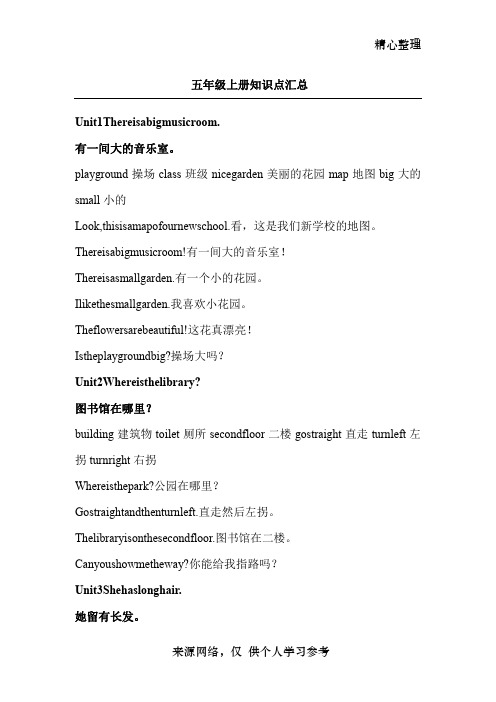
精心整理五年级上册知识点汇总Unit1Thereisabigmusicroom.有一间大的音乐室。
playground操场class班级nicegarden美丽的花园map地图big大的Thelibraryisonthesecondfloor.图书馆在二楼。
Canyoushowmetheway?你能给我指路吗?Unit3Shehaslonghair.她留有长发。
girl女孩boy男孩hair头发short短的long长的kind和蔼的face脸Whoishe?他是谁?HeisJohn.他是约翰。
Hehasshorthair.他留有短发。
Whoisshe?她是谁?They’rehis!它们是他的。
Unit5Whatdoyouusuallydo?你通常干什么?morning早晨afternoon下午evening傍晚night夜晚wash洗makethebed铺床Whatdoyouusuallydointheevening?你晚上通常做什么?Iusuallywashmyclothes.我通常洗衣服。
Ialwaysmakemybed.ThenIdoexercises.我总是铺床然后做锻炼。
What’syourfavouritetimeoftheday?你每天最喜欢什么时候?Iwanttobeadoctor.我想成为一名医生。
Iwanttobeapoliceman.我想成为一名警察。
WhenI’m20,Iwanttobeanurse.当我20岁的时候,我想成为一名护士。
Unit8Whatdoesyourfatherdo?你的父亲是干什么的?father父亲mother母亲parents父母work工作hospital医院company 公司Whatdoesyourfatherdo?你的父亲是干什么的?Heisaworker.Heworksinacompany.他是一位工人。
他在一家公司上班。
Whatareyoudoing?你在干什么?I’mmakingjiaozi.我正在包饺子。
- 1、下载文档前请自行甄别文档内容的完整性,平台不提供额外的编辑、内容补充、找答案等附加服务。
- 2、"仅部分预览"的文档,不可在线预览部分如存在完整性等问题,可反馈申请退款(可完整预览的文档不适用该条件!)。
- 3、如文档侵犯您的权益,请联系客服反馈,我们会尽快为您处理(人工客服工作时间:9:00-18:30)。
Guo Liang often helps him pick fruit. 特殊的变复数:potatoes、tomatoes、classes、 cherry-cherries、woman-women、man-men 单复同形保持不变:sheep、fish、people 特殊的变三单:have-has、do-does 将来时中动词一律用原形,不考虑前面第几人称。 I'm going to travel. He's going to travel. I'll go to Hainan. She will go to Hainan. 用什么提问用什么回答: 问be going to,答be going to。问will,答will 问did,答过去式。问doing,答动词ing形式。 Do 提问,do或don't 回答
There is...... 和 Is there...... 后面都加单数,There are...... 和 Are there...... 后面都加复数。 There is a river near the village. Is there a river near the village? There are some ducks in the river. Are there any ducks in the river? 特殊情况单复同形的词不变(sheep/ fish/ people) There are lots of fish in the river. Are there any fish in the river? How many 后面一般加名词复数,单复同形不变。 How many goats do you have? How many sheep do you have?
Does he enjoy his stay in China? Yes, he does. No, he doesn't. 用Do提问,用do或者don't 回答 Do you enjoy your stay in China? Yes, I do. No, I don't. man 1个男人 men 多个男人 woman 1个女人 women 多个女人 beside= near=next to在旁边,在附近,临近靠近 behind 在后面 garden 花园 supermarket 超市 bookshop 书店 school 学校 sports center 运动中心 hospital 医院
go ice fishing/ dog sledding/ skating play ice hockey 打各种球,演奏各种乐器都用play an art school/ an unbrella/ an apple shakting 滑冰 ski 滑雪 含有did 的问句中动词用原形,答语动词用过去式 What did you do in the holidays? I learned Beijing Opera. Did you learn it in an art school? didn't 后面加动词原形 I didn't go ice fishing. 用Did 提问,用did或didn't回答 Did you take pictures? Yes, I did. No, I didn't. 和谁一起做某事用with I palyed it with my dad. 为谁做什么用for I took pictures for them.
跟谁学习秧歌舞用from I learned the yangge dance from grandma. 早餐吃了什么用for I had yuanxiao for breakfast. last引起的时间表过去 last year/ last Sunday 祈使句后面加动词原形 Don't shout please. Let's cross the street. deer 鹿,ee代表两只鹿角,dear 亲爱的人 cold 感冒 cough 咳嗽 headache 头疼 fever 发烧 health 健康(名词) healthy 健康的(形容词) How can we keep healthy?It makes us healthy and srrong. Junk food is not good for our health.
Does 提问,does 或 doesn't 回答 Did 提问,did 或 didn't 回答 Is there 提问,there is 或 there isn't 回答 Are there 提问,there are 或 there aren't 回答 人+excited I was excited. Peter is excited. 事或物+exciting It's really exciting to go to middle school. Do you have any plans for the summer? I want to be a swimming star. It must be fun. (It) sounds good. weekday 和weekend
你有多少什么用do you have? 如果问某人有多少什么?do变does,用三单。 How many ducks do you have? How many tomatoes does the girl have? How many potatoes does the boy have? sheep 绵羊 goat 山羊 tomato 西红柿 potato 土豆, 变复数特殊加es want to 加动词原形 I want to catch fish. What are these? They're ....... on the farm in the trees by bus potato/ tomato plants / fruit trees变复数变后面
Dno't worry. 人加worried 担心什么用about I'm worried about my lessons. How can we keep healthy? 我们怎样保持健康? We should... 应该 We shouldn't... 不应该 An apple a day keeps the doctor away. 对我们的眼睛不好,健康不好,用for。 It's bad for our eyes. Junk food is not good for our health. 不能玩太长时间用for We shouldn't play computer games for too long. neighbour 邻居 neighbourhood 社区
What are you going to do this summer holiday? I'm going to.... What will you do this summer holiday? I'll...
雨伞前面用an take an umbrella It often rains in London. I can learn a lot from the trip. 从旅行中学到 Everyone is getting ready for middle school life. 为。。。而做好准备 It's time to say goodbye to... have to 不得不+动词原形 make plans 制定计划 where 去哪里---地方 what 干什么---事 when 什么时候----具体时间或不确定时间 not sure who 谁----人 how 怎样去---交通工具 by...
问句中有doing,问的是正在做什么?回答ing形式。 What are the men doing in the garden? They're playing Chinese chess. 不同于...用from Chinese chess is different from our chess. 用Is there 提问,用there is或there isn't . No, there isn't. 用Are there提问,用thre are 或there aren't回答 Are there any cows on the farm? Yes, there are. No, there aren't. There are some/many/lots of..... Are there any...... There aren't any...(any用在疑问句和否定句中)
